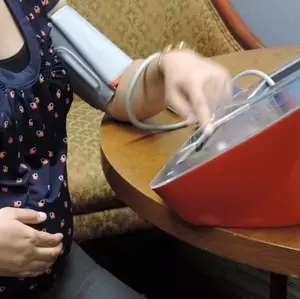- Home
- Medical news & Guidelines
- Anesthesiology
- Cardiology and CTVS
- Critical Care
- Dentistry
- Dermatology
- Diabetes and Endocrinology
- ENT
- Gastroenterology
- Medicine
- Nephrology
- Neurology
- Obstretics-Gynaecology
- Oncology
- Ophthalmology
- Orthopaedics
- Pediatrics-Neonatology
- Psychiatry
- Pulmonology
- Radiology
- Surgery
- Urology
- Laboratory Medicine
- Diet
- Nursing
- Paramedical
- Physiotherapy
- Health news
- Fact Check
- Bone Health Fact Check
- Brain Health Fact Check
- Cancer Related Fact Check
- Child Care Fact Check
- Dental and oral health fact check
- Diabetes and metabolic health fact check
- Diet and Nutrition Fact Check
- Eye and ENT Care Fact Check
- Fitness fact check
- Gut health fact check
- Heart health fact check
- Kidney health fact check
- Medical education fact check
- Men's health fact check
- Respiratory fact check
- Skin and hair care fact check
- Vaccine and Immunization fact check
- Women's health fact check
- AYUSH
- State News
- Andaman and Nicobar Islands
- Andhra Pradesh
- Arunachal Pradesh
- Assam
- Bihar
- Chandigarh
- Chattisgarh
- Dadra and Nagar Haveli
- Daman and Diu
- Delhi
- Goa
- Gujarat
- Haryana
- Himachal Pradesh
- Jammu & Kashmir
- Jharkhand
- Karnataka
- Kerala
- Ladakh
- Lakshadweep
- Madhya Pradesh
- Maharashtra
- Manipur
- Meghalaya
- Mizoram
- Nagaland
- Odisha
- Puducherry
- Punjab
- Rajasthan
- Sikkim
- Tamil Nadu
- Telangana
- Tripura
- Uttar Pradesh
- Uttrakhand
- West Bengal
- Medical Education
- Industry
High BP in early pregnancy raises preeclampsia risk during pregnancy

USA: Going by the new definitions of hypertension, women in their early pregnancy having elevated blood pressure and, stage 1 and stage 2 hypertension are at increased risk for preeclampsia, a recent study has revealed. Findings of the study, published in the journal Obstetrics & Gynecology, lay emphasis on the importance of applying the 2017 BP guidelines to reproductive-aged women.
The American College of Cardiology and the American Heart Association in their 2017 guideline modified the clinical definitions of hypertension in adults. According to the guideline, elevated BP is defined as systolic BP 120-129 mm Hg and diastolic BP less than 80, stage 1 hypertension as SBP of 130-139 or diastolic BP of 80-89 mm Hg. While stage 2 hypertension is defined as having SBP of 10 or higher and DBP of 90 or higher.
Elizabeth F. Sutton, Janet M. Catov, Magee-Womens Research Institute, Pittsburgh, PA, and colleagues conducted the study to determine whether women with early pregnancy elevated blood pressure (BP) or stage 1 hypertension are at increased risk of preeclampsia and maternal or neonatal morbidity.
For the purpose, the researchers conducted a clinical cohort study of 18,162 women who delivered a singleton neonate from 2015 to 2018 and attended at least two prenatal appointments before 20 weeks of gestation. Data were collected within the Magee Obstetric Maternal and Infant database -- an aggregate of prenatal and delivery health records.
Early pregnancy BP was defined as average BP before 20 weeks of gestation, and women were classified with normal, elevated BP, stage 1 or 2 hypertension according to current guidelines. The primary outcome was preeclampsia.
Key findings of the study include:
- 75.2% of the women were categorized with normal BP, 13.9% with elevated BP, 5.4% with stage 1 hypertension, and 5.5% with stage 2 hypertension.
- Risk of preeclampsia increased in a stepwise fashion with increasing BP category, adjusted for covariates (normal BP, 4.7%, referent; elevated BP, 7.3%, adjusted odds ratio [aOR] 1.29; stage 1, 12.3%, aOR 2.35), and stage 2, 30.2%, aOR 6.49).
- Results were similar among black and white women.
- Gestational diabetes was more prevalent among women with stage 1 (11.4%) and stage 2 hypertension (14.2%).
- Severe maternal morbidity and neonatal morbidity were increased only among women with stage 2 hypertension.
"Women with elevated BP, and stage 1 and 2 hypertension in early pregnancy are at increased risk for preeclampsia, wrote the authors."
"These findings emphasize the importance of applying the 2017 BP guidelines to reproductive-aged women. Strategies to incorporate these guidelines into obstetric care may also be warranted," they concluded.
The study, "Early Pregnancy Blood Pressure Elevations and Risk for Maternal and Neonatal Morbidity," is published in the journal Obstetrics & Gynecology.
Dr Kamal Kant Kohli-MBBS, DTCD- a chest specialist with more than 30 years of practice and a flair for writing clinical articles, Dr Kamal Kant Kohli joined Medical Dialogues as a Chief Editor of Medical News. Besides writing articles, as an editor, he proofreads and verifies all the medical content published on Medical Dialogues including those coming from journals, studies,medical conferences,guidelines etc. Email: drkohli@medicaldialogues.in. Contact no. 011-43720751


